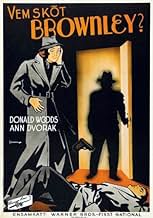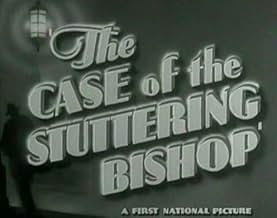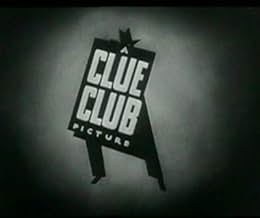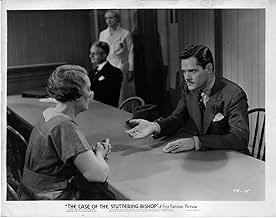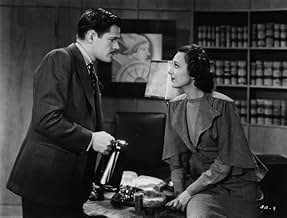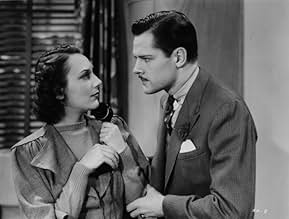AVALIAÇÃO DA IMDb
6,2/10
614
SUA AVALIAÇÃO
Adicionar um enredo no seu idiomaAn improbable stuttering bishop from Australia asks for Perry Mason's help in proving the identity of the legitimate heir to a millionaire.An improbable stuttering bishop from Australia asks for Perry Mason's help in proving the identity of the legitimate heir to a millionaire.An improbable stuttering bishop from Australia asks for Perry Mason's help in proving the identity of the legitimate heir to a millionaire.
- Direção
- Roteiristas
- Artistas
Helen MacKellar
- Stella Kenwood
- (as Helen McKellar)
Charles C. Wilson
- Hamilton Burger
- (as Charles Wilson)
Eddy Chandler
- Detective James Fleet
- (não creditado)
- Direção
- Roteiristas
- Elenco e equipe completos
- Produção, bilheteria e muito mais no IMDbPro
Avaliações em destaque
Donald Woods and Ann Dvorak were fine as Perry Mason and his secretary, Della Street, but it took me a while to get used to not seeing Raymond Burr in the Mason role. The complicated plot involves two women named Janice who claim to be the heir to the fortune of Douglas Wood, and an Australian bishop who asks Mason to see Mira McKinney, who can prove which one is the real one. But Wood is killed going to the rendezvous with McKinney, who is charged with murder. In customary Perry Mason style, there is a final courtroom scene (in this case only a hearing) where Mason flushes out the killer and the phony Janice. I enjoyed trying to follow the plot and the comedy that was prevalent. Tom Kennedy suddenly remembers an important item when he hears the name "Sampson," because it involves a ship called "Delilah." Woods always asking Dvorak to remind him to give her a raise when she gets a good idea (a running gag). Even the bishop, who explains he stutters only when under some emotional stress, provides some comedy at the end. He sheepishly stammers "g-g-goodness g-g-gracious" when three of the principal women kiss him goodbye.
Maybe you can keep up with the plot convolutions better than I could. Finally I lost track of the yellow or pink or white raincoats and threw in the towel. Anyway, it's a mildly entertaining Mason entry, at best. As a matter of fact, it looks to me like Warner Bros. had lost interest in the series—(for example, compare the sparse production values here with the richly produced The Case of the Curious Bride {1935}). This was the last installment and features a boyish Donald Woods as the legal wizard and sleuth. Frankly, in my book, he lacks the forceful presence required to bring off the role in authoritative fashion, and was, perhaps, a last minute replacement for the more familiar Warren William. Ironically, it's this installment that more closely resembles the TV show with its first-part dramatic setup and second-part courtroom pyrotechnics. Too bad the exotic Ann Dvorak is largely wasted as a recessive Della Street— with her distinctive looks and lively personality, she should have been one of the suspects. All in all, the 70 minutes is for hardcore fans of the series and for fans of the perennially addled Tom Kennedy as the aptly named "Magooney".
The Perry Mason series of mysteries from the 1930s are some of the best mysteries one could watch. One needs to pay attention to details throughout the film to follow the twists in the plot, which in this movie is very complicated. The movies closely follow the Erle Stanley Gardner mystery novels on which they are based. The Case of the Stuttering Bishop holds one's interest from beginning to end as Perry Mason cleverly addresses the case of a murder committed over a will, inheritance and the fraudulent identity of a key player. Donald Woods does not play the role of Perry Mason as well as Warren William did in this series. William plays the role with panache and wit, whereas Donald Woods plays the role straightforward with no flair—serviceable but not exciting. Ann Dvorak plays the role of Della Street straightforward also with none of the sassiness and cuteness of Genevieve Tobin and none of the glamour and screen presence of Helen Trehnolme in other movies in the series. If you are a fan of old, intriguing mysteries, you won't be disappointed with this gem.
Donald Woods stars as Perry Mason in "The Case of the Stuttering Bishop," a 1937 film that also stars Ann Dvorak as a lively Della Street. Frank Faylen is also on hand to pep things up a bit. Both of them are needed, because Donald Woods isn't terribly exciting. Of the men who played Perry Mason in the films, he is perhaps the closest rendering to the actual character. But the book Perry Mason was just that - for books - and it would take Gardner himself to not only choose Raymond Burr (the original Perry Mason was supposed to be Fred MacMurray until Gardner saw Mason at an audition for Hamilton Burger) but oversee the scripts to make the translation to the moving image.
The story concerns a mysterious bishop who asks Perry to help clear a woman accused of manslaughter many years earlier. From there, the story gets into mistaken identity - is a woman posing as an heiress or isn't she - and the solving of a murder. It's a very complicated plot, so pay attention. And Paul Drake is old. If you can sort it all out, you'll find it interesting. There's a little comedy to be had, which is helpful.
I like watching the Perry Mason movies, if only to see the different interpretations of the various roles and the emphasis put into the stories, but in the end, it's best to forget who these characters are supposed to be - because after watching the TV show for years, none of them are. So don't expect much in that department, and you won't be disappointed.
The story concerns a mysterious bishop who asks Perry to help clear a woman accused of manslaughter many years earlier. From there, the story gets into mistaken identity - is a woman posing as an heiress or isn't she - and the solving of a murder. It's a very complicated plot, so pay attention. And Paul Drake is old. If you can sort it all out, you'll find it interesting. There's a little comedy to be had, which is helpful.
I like watching the Perry Mason movies, if only to see the different interpretations of the various roles and the emphasis put into the stories, but in the end, it's best to forget who these characters are supposed to be - because after watching the TV show for years, none of them are. So don't expect much in that department, and you won't be disappointed.
As someone who has read all 82 of the Perry Mason novels, I have to say that this is the best I've seen of the Warner Brothers Perry Mason films. Readers of Gardner's mysteries will appreciate how faithfully the screen writers were able to keep to the essentials of the original plot in this short 70 minute film.
This film is far superior to the turkeys WB made with Warren William (although that's not saying much.) And Donald Woods was more like the literary Mason than Raymond Burr, who was almost fat enough by the end of the TV series to play Nero Wolfe!
And, of course, there's the great 1930's atmosphere in this film, something the TV series could never hope to reproduce.
This film is far superior to the turkeys WB made with Warren William (although that's not saying much.) And Donald Woods was more like the literary Mason than Raymond Burr, who was almost fat enough by the end of the TV series to play Nero Wolfe!
And, of course, there's the great 1930's atmosphere in this film, something the TV series could never hope to reproduce.
Você sabia?
- CuriosidadesAuthor Erle Stanley Gardner objected so vehemently to what he felt was the miscasting of Ricardo Cortez as Mason, that Warners replaced him with Donald Woods.
- Erros de gravaçãoNear the end, when Mason and his crew are having lunch during a court recess, Della drops her fork on her plate and reaches out across the table to break off some bread (after giving Mason the inadvertent hunch about Stella Kenwood). When the camera cuts back to Mason, Della has fork in hand again, but not the bread.
- Citações
Perry Mason: [to Della] Bishops don't often need lawyers. Show him in.
- ConexõesFeatured in À beira do abismo (1946)
- Trilhas sonorasWhen Irish Eyes Are Smiling
(1912) (uncredited)
Music by Ernest Ball
Lyrics by Chauncey Olcott and George Graff
Sung a cappella with a phony Irish brogue by Donald Woods
Principais escolhas
Faça login para avaliar e ver a lista de recomendações personalizadas
Detalhes
- Data de lançamento
- País de origem
- Idioma
- Também conhecido como
- The Case of the Stuttering Bishop
- Locações de filme
- Empresa de produção
- Consulte mais créditos da empresa na IMDbPro
- Tempo de duração
- 1 h 10 min(70 min)
- Cor
- Mixagem de som
- Proporção
- 1.37 : 1
Contribua para esta página
Sugerir uma alteração ou adicionar conteúdo ausente

